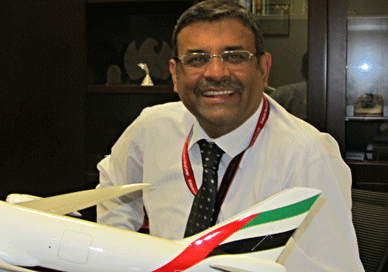Emirates
SkyCargo Adds To Africa
 “While
many regions are experiencing challenging economic conditions, Africa—with
a population in excess of one billion and rich in natural resources—is
one of the few areas to record growth, and the long-term outlook is
very positive,” said Ram Menen, Emirates’ Divisional Senior
Vice President Cargo, as Emirates Sky Cargo sets service to Lusaka,
Zambia and Harare, Zimbabwe on February 1, less than three months after
the launch of a dedicated weekly freighter to Accra and Lome. “While
many regions are experiencing challenging economic conditions, Africa—with
a population in excess of one billion and rich in natural resources—is
one of the few areas to record growth, and the long-term outlook is
very positive,” said Ram Menen, Emirates’ Divisional Senior
Vice President Cargo, as Emirates Sky Cargo sets service to Lusaka,
Zambia and Harare, Zimbabwe on February 1, less than three months after
the launch of a dedicated weekly freighter to Accra and Lome.
“We expect demand to be strong for
a variety of commodities going in and out of Lusaka and Harare, and
have no doubt the two destinations will be a strong addition to our
African network,” Mr. Menen added.
The Dubai-Lusaka-Harare service will operate
five times a week by an A330-200, providing a total weekly cargo capacity
of up to 160 tons.
South Africa is Emirates SkyCargo’s
key trading point on the continent, with a weekly capacity of more than
1,500 tonnes spread across the belly-hold of 84 passenger flights serving
Johannesburg, Cape Town and Durban, as well as two dedicated Johannesburg
freighters.
Dedicated freighters also operate to Eldoret
and Lilongwe, while the other points on Emirates SkyCargo’s African
network—Abidjan, Addis Ababa, Accra, Cairo, Casablanca, Dakar,
Dar el Salaam, Entebbe, Khartoum, Lagos, Luanda, Nairobi, Tripoli, and
Tunisia—are served using either the belly-hold of wide-body passenger
aircraft, or a combination of the belly-hold and freighters.
“We have slowly built up our presence
on the continent since we launched flights to Cairo in 1986 and in recent
years, as Africa started to realize its huge potential, we began operating
to Cape Town, Durban, Luanda and Dakar,” added Menen.
“With such a comprehensive service
now in place, we are in a good position to help sustain Africa’s
continued economic development by facilitating international trade with
its business partners and opening it up to new markets on our ever-expanding
network.”
Zambia has been enjoying an economic boom,
driven by record copper prices and continued foreign investment in its
mining industry and infrastructure, while Zimbabwe's economy is growing
at a brisk pace despite continuing political uncertainty.
Emirates SkyCargo expects to transport
parts to support the mining and infrastructure sectors—as well
as of commodities such as garments, computer parts, and pharmaceuticals—from
the likes of the Far East, Australasia, the Indian Subcontinent, Middle
East, Europe and North America. Fresh flowers, fruit, and vegetables
will be among the main commodities shipped in the other direction, while
trade generated by neighboring countries is also expected.
EK 713 will depart Dubai every Monday,
Tuesday, Wednesday, Friday, and Sunday at 0925hrs, arriving in Lusaka
at 1450hrs. The service will depart Lusaka at 1620hrs, arriving in Harare
at 1720. The return flight leaves Harare at 1920, arriving Lusaka at
2020. It departs Lusaka at 2150 and lands in Dubai at 0710hrs the next
day.
Flossie
|



